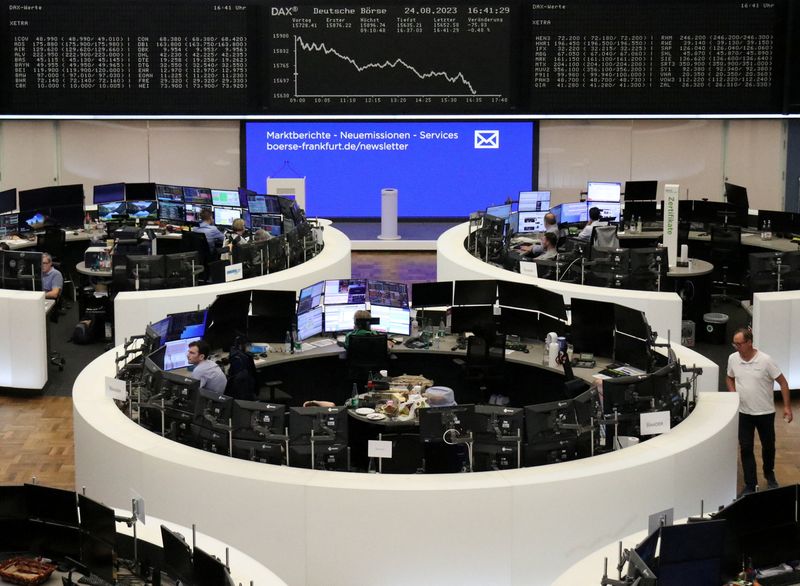A look at the day ahead in European and global markets from Wayne Cole
Chinese blue chips were enjoying a rare rally on Monday after Beijing rolled out more measures to support the market.
These included halving the stamp duty on stock trading, slowing the pace of new offerings and approving the launch of 37 retail funds to invest in stocks. All of which followed Friday's steps to support housing.
While hardly the sort of massive fiscal stimulus investors crave, it was welcome that Beijing at least understood that assistance was needed, and stocks gained around 2.5%. If sustained that would be the second-biggest daily gain this year, which just goes to show how moribund the market has been.
Stocks need all the help they can get. Data released over the weekend showed profits at China's industrial firms fell for the seventh straight month in July - one reason the CSI300 trades at a PE of 27, compared with 22 for the S&P 500.
Troubles in the property sector were highlighted when China Evergrande shares resumed trading with a drop of 80%. A stock that was one priced above HK$30 is now 39 cents.
All of which is happening as U.S. Commerce Secretary Gina Raimondo starts three days of talks with Beijing aimed at boosting business ties between the world's two largest economies.
Elsewhere, Wall Street stock futures are a shade firmer with the market seemingly relieved that Fed Chair Powell wasn't out-and-out hawkish. Then again, it wasn't exactly dovish for him to acknowledge the economy was running stronger than the Fed had expected: The latest Atlanta Fed GDPNow estimate for this quarter is 5.9%.
So the onus is on the data to show a cool-down, or risk another rate hike. Fed fund futures now imply a 55% chance of a hike by year end, compared with 32% a week ago, while the expected easing for next year is down to 92 basis points from around 130 basis points at the start of this month.
Recent PMI data did point to a slowdown, with services particularly disappointing. Analysts note the PMIs have a better track record on predicting the European economies than for the U.S., where the ISM survey reigns supreme. That report is out at the end of this week - along, of course, with payrolls.
Median forecasts are for a further modest slowing in jobs growth to 170,000, though JPMorgan (NYSE:JPM) is warning of the risk of a downside surprise because of the writers and actors strikes in Hollywood. They are tipping a jobs gain of 125,000, which would be the lowest since early 2021 when the pandemic was still messing with the labour market.
A result like that would see markets again scale back the risk of another Fed hike and offer a much-needed lift to Treasuries, where two-year yields are threatening the year's top - and a major chart bulwark - at 5.12%.
Key developments that could influence markets on Monday:
- Riksbank Deputy Governor Martin Floden speaks

- U.S. Fed's Michael Barr speaks
- Euro zone money supply for July
(By Wayne Cole; Editing by Edmund Klamann)